Is your retail business doing fine without AI? Think again.
Actually, it’s not keeping pace. The rulers in the retail landscape, whether digital-first brands or enterprise chains, all leverage AI's full potential to predict trends, optimize operations, and deliver personalized customer experiences.
Eyeing this, most of the brands are increasingly investing in retail AI software development based on their unique business requirements and models.
| Over 90% of companies already use AI or actively analyze its potential. Moreover, 92% plan to increase their AI investments within the next three years. |
We totally understand that, like other retail businesses, you are also unsure where to start, how to build retail AI software, what features to prioritize, or how much budget to keep aside.
Not to fret! We are here with this guide to help you cover everything essential for AI retail software development, including the benefits you can reap, the costs of building AI-powered retail software, and more.
Let’s get the ball rolling.
Retail AI software can be a custom-built or pre-configured solution that utilizes artificial intelligence (AI) to improve, automate, or optimize retail operations. By analyzing real-time data, businesses make faster decisions, enhance customer experiences, and diminish manual tasks.
Compared to traditional retail tools, AI-powered software adapts and innovates with every transaction, customer interaction, and inventory update. By going beyond automation, it can analyze trends, anticipate behavior, and personalize shopping experiences across numerous channels.
You can build retail AI software from scratch for your specific brand requirements or integrate it to boost the capabilities of your retail business.
With the distinct needs of every retail company, the demand for different types of retail AI software also differs.
Whatever be your requirements, to better understand customer behavior, automate stock tracking, or personalize marketing campaigns, you can opt for a specialized AI software solution for retail.
In this section, we will walk you through the various kinds of AI software that you can choose to develop for your firm, their use, key features, target users, and pro tips for AI developers.
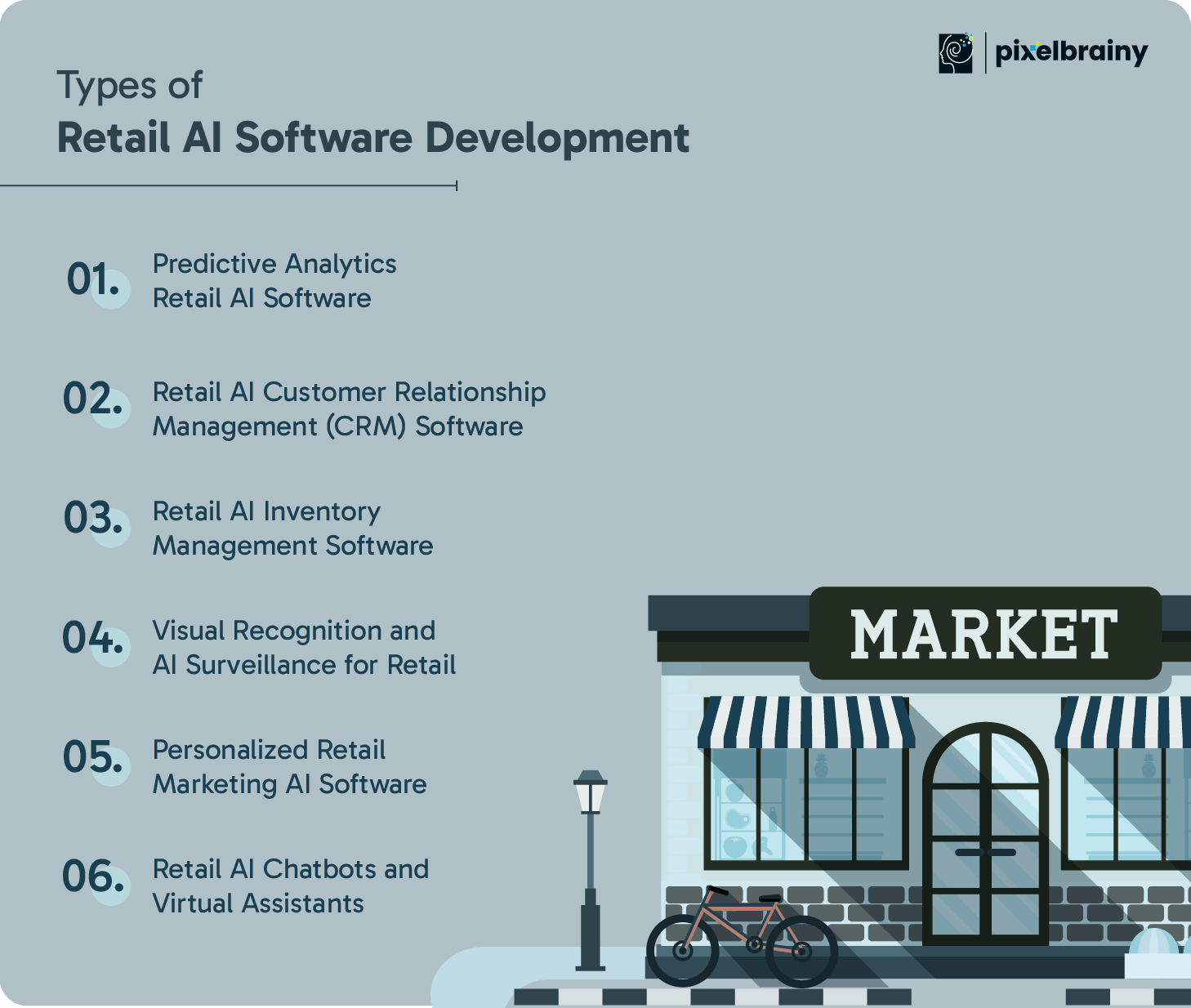
The software is valuable for retailers that help them make smarter inventory and pricing decisions by anticipating customer demand, seasonal trends, and buying behavior. This reduces overstock and stockouts, leading to improved profitability and planning precision.
Core Features:
Demand forecasting, price optimization, sales trend analysis, and promotion impact prediction
Best for:
Mid-sized to large retailers with past sales data aiming to streamline inventory and boost revenue
Development tip:
You should ensure integrating reliable data sources (sales, customer behavior, and market trends) and create models that can retrain with new inputs over time
By opting for retail AI CRM software, businesses can deeply analyze their customers and personalize communication extensively. AI-enhanced CRM systems can divide users, forecast churn, and recommend tailored reach, increasing retention and lifetime value.
Core Features:
Customer segmentation, churn prediction, behavior-based targeting, and next-best-action suggestions
Best for:
Retailers with an expanding customer base, specifically subscription-based, loyalty-driven, or omnichannel brands
Development tip:
Developers should aim at integrating with customer data platforms, email/SMS marketing tools, and real-time engagement analytics
Retailers looking to efficiently stock their shelves can utilize the potential of retail AI inventory management software by scrutinizing demand patterns, supplier timelines, and sales velocity. You can also mitigate the carrying costs, avoid out-of-stock situations, and boost supply chain responsiveness.
Core Features:
Real-time inventory tracking, automated stock alerts, demand prediction, and reorder automation
Best for:
Retailers with various store locations, warehouses, or fast-moving inventory, particularly those with seasonal or regional demand variations
Development tip:
Make sure you perfectly integrate POS systems, ERP platforms, and supplier APIs for real-time synchronization and actionable insights
The software is best at improving in-store operations and security, reaping the benefits of AI-powered image and video analysis. From tracking foot traffic to identifying theft or examining shelf engagement, it comes with ultimate visibility to physical store behavior.
Core Features:
People counting, heat mapping, theft detection, and shelf monitoring
Best for:
Brick-and-mortar retailers, supermarkets, malls, or retail chains seeking to improve physical security and customer experience insights
Development tip:
You can merge high-quality camera input with real-time processing models, and remember to stay in compliance with local data privacy regulations
You can deliver tailored marketing messages, promotions, and product suggestions depending on customer behavior and preferences leveraging the power of personalized retail marketing AI software. Thus, you can elevate conversion rates, basket size, and long-term engagement.
Core Features:
Personalized content delivery, dynamic offers, AI-driven product recommendations, and multi-channel targeting
Best for:
E-commerce brands, D2C retailers, and omnichannel businesses that seek high personalization
Development tip:
Utilize customer purchase history and browsing behavior and effortlessly integrate with ad platforms, email marketing, and push notification systems
This type of retail AI software delivers instant, 24/7 customer support via conversational AI. It guides purchases, handles FAQs, and resolves issues without human intervention. Moreover, it supports in-store kiosks and voice-based shopping.
Core Features:
Natural language processing, multilingual support, product search assistance, and order tracking
Best for:
Retailers with high customer interaction volume, especially online stores, mobile apps, and businesses managing heavy volumes of customer interactions
Development tip:
Opt for pre-trained language models tailored to retail and ensure a smooth handover to human agents for complex queries
Today, when AI is transforming every sector, investing in AI retail software solutions development will let you experience smarter, leaner, and more adaptive operations that can help your business be at the forefront in a fast-changing market.
Below are the reasons you can benefit from building AI-powered retail software backed by facts and figures.
1. The AI in retail market valuation is predicted to boost from $31.12 billion in 2024 to $164.74 billion by 2030, at a CAGR of around 32.0%.
2. The surging growth of eCommerce and the boosting adoption of omnichannel retail strategies result in increasing AI implementation in the sector.
3. AI adoption in retail industry 2025 also assists marketing teams in creating personalized and targeted messages rapidly and more efficiently. Around 58% of retailers are already making the most of generative AI to create assets for ads, emails, social media, and websites.
4. Artificial Intelligence in the retail market in the US will likely grow notably, hitting a predicted value of $17.76 billion by 2032, fueled by the rise of AI chatbots for retail businesses that help improve customer experience.
5. The US is ruling the AI retail integration landscape. Considering real-time examples, Amazon uses machine learning for demand forecasting. Walmart is also running on the same track and has started using AI technology in retail to automate the shelf scanning procedure and simplify supply chain routing.
In a nutshell, investing in retail AI software will keep you ahead of the curve. If you start now, you can learn swiftly, iterate smarter, and catch up with an edge that leaders are still struggling to reach.
Now, you would like to know what are the benefits of using AI in retail industry. Let's clear it up.
Custom retail AI software helps retailers reshape how they operate, compete, and serve their customers.
Below are the key advantages you can expect when developing retail AI software solutions.
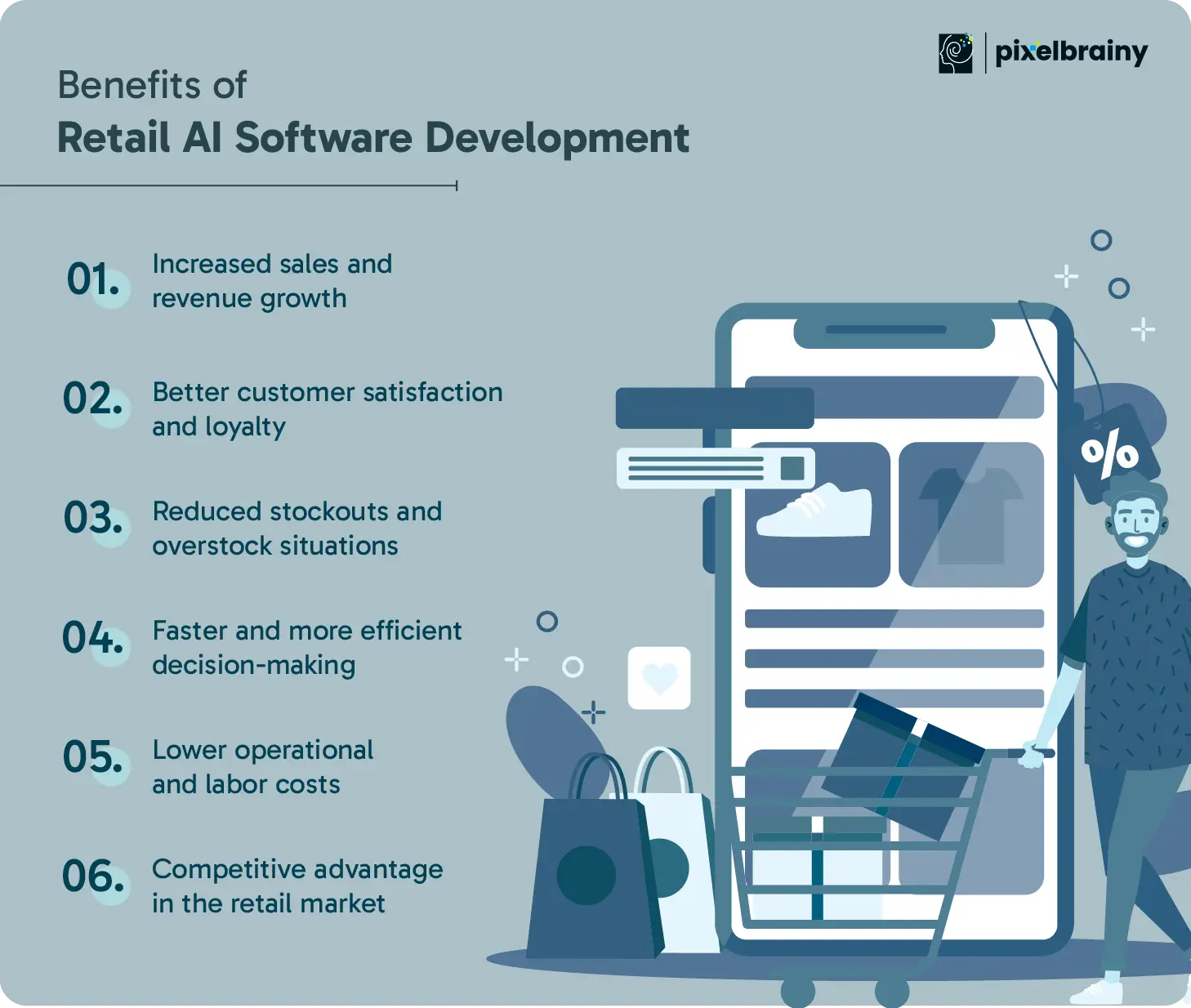
Integrating AI in your business, you can experience precision in product recommendations, personalized promotions, and dynamic pricing strategies. Such capabilities magnetize more conversions and increase average order value. Ultimately, this fuels consistent revenue growth across channels.
Choosing AI for customer experience in retail lets you deliver personalization, real-time support, and proactive engagement. Thus, retailers foster stronger relationships with customers. And undoubtedly, satisfied shoppers are predicted to return and recommend your brand.
AI inventory optimization software accurately anticipates demand and automates replenishment. This AI-driven demand forecasting for retail helps diminish lost sales from out-of-stock items and reduces holding costs of overstocked products.
Predictive analytics retail software with real-time dashboards and the power of AI delivers retail teams data-backed insights. This leads to shortening decision cycles and reducing dependency on guesswork, specifically in evolving retail environments.
By automating repetitive jobs, like inventory tracking, customer support, and sales forecasting, AI solutions for eCommerce and retail lower manual workload, streamline operations, and assist in cutting labor and overhead expenses.
Early AI adopters are already outshining the competition. With custom AI software, retailers move faster, personalize better, and respond smarter to dynamic trends and customer requirements.

AI is modernizing every part of retail, from how products are stocked to how customers interact with brands.
Below are the most impactful and emerging use cases of AI retail software development, with examples of top AI retail businesses and development tips:
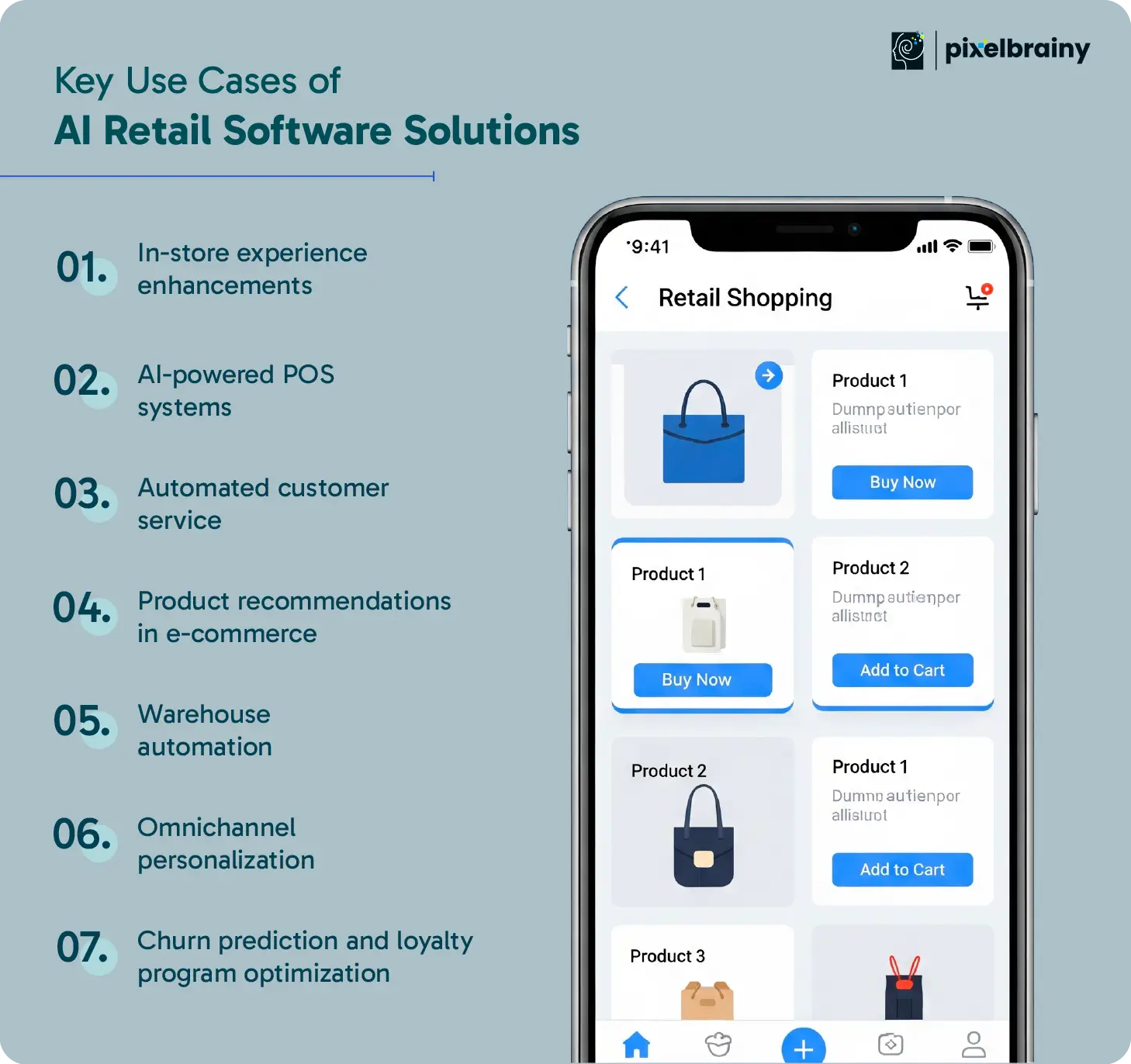
AI-powered retail software solutions improve physical shopping through real-time inventory tracking and personalized customer interactions.
Example: Amazon Go utilizes smart shelf sensors and facial recognition for smooth, cashier-less checkout.
Development Insight: Integrate AI vision models with IoT devices to identify shelf status, monitor movement patterns, and personalize engagement on screens or mobile.
Such software helps transform point-of-sale into a smart business assistant with the power of real-time insights, recommendations, and analytics.
Example: Square and Shopify POS leverage the potential of AI to recommend upsells, track sales trends, and personalize customer checkouts.
Development Insight: Choose to create your POS with a modular AI engine that learns from transactions and seamlessly integrates with loyalty programs and CRM systems.
Retail AI software development provides 24/7 support using AI chatbots, voice assistants, and NLP to manage queries, returns, and complaints.
Example: H&M and Sephora empower their businesses with chatbots for virtual assistance, reducing support load and boosting customer satisfaction.
Development Insight: Opt for large language models (LLMs) that are fine-tuned with your order policies, FAQs, and product catalog to ensure context-aware support.
You can increase conversions by proposing relevant products to users based on their behavior, preferences, and purchase history.
Example: Amazon’s recommendation engine contributes to its increased sales, showing the strength of retail personalization using AI.
Development Insight: Fuse collaborative filtering with deep learning models for personalized, intent-based product discovery.
You can develop AI retail automation software that streamlines logistics utilizing the potential of AI-powered robots, predictive inventory, and optimized picking strategies.
Example: Walmart and Alibaba deploy AI-driven robots and computer vision to speed up order fulfillment and diminish human error.
Development Insight: Smoothly integrate AI with WMS (Warehouse Management Systems) for load balancing, real-time routing, and autonomous control.
Such solutions also help deliver a consistent and tailored experience across web, mobile, store, and social platforms.
Example: Nike syncs online and in-store profiles to provide personalized app content, promotions, and recommendations.
Development Insight: Utilize customer identity graphs and AI segmentation to sync touchpoints and personalize in real time across platforms.
AI-powered retail software solutions detect at-risk customers and increase retention by personalizing offers and rewards.
Example: Starbucks’ AI-driven loyalty program anticipates user behavior and sends timely, personalized offers to re-engage customers.
Development Insight: Train machine learning models on churn indicators like order gaps, reduced basket size, and engagement drop-offs to activate retention campaigns.
So, whatever be your requirements, by running AI solutions for eCommerce and retail in your mobile app, website, or powering in-store decision-making, you can make your retail brand operate smartly with less guesswork.
What AI features are needed in retail software that can make it stay ahead of competitors?
While you build AI retail software, you need to prioritize the features meticulously as it can make or break its impact.
If you are planning to develop one for your retail business, these are the must-have features to consider.
| Feature | Description |
| Personalized product recommendations | It suggests relevant products to every shopper using AI algorithms that help analyze behavior, preferences, and past purchases |
| AI-powered chatbots for customer support | This feature handles FAQs, order status, and product inquiries with 24/7 instant assistance, lowering human workload |
| Visual search to find products using images | It allows users to upload or scan images to find exact or similar products across your catalog |
| Voice-activated shopping assistants | The software feature permits hands-free product search and cart management via smart speakers or in-app voice tools |
| Smart checkout (e.g., cashier-less checkout) | It accelerates in-store purchases with computer vision and sensors, permitting customers to skip traditional lines |
| Real-time stock availability notifications | This notifies customers instantly when an out-of-stock item is restocked or available in nearby locations |
| Augmented Reality (AR) for virtual try-ons | It allows customers to visualize products, like apparel, accessories, or furniture, before purchasing |
| Dynamic pricing is displayed to customers | The feature adjusts real-time pricing based on demand, seasonality, or user behavior to boost conversions |
| Loyalty and rewards program management | This tracks points, provides personalized rewards, and increases retention through AI-driven engagement strategies |
| Personalized promotions and discounts | It delivers custom offers based on shopper profiles, increasing conversion while minimizing blanket discounting |
| Customer sentiment analysis through reviews and feedback | The feature utilizes NLP to detect mood, satisfaction, or issues from customer reviews and service comments |
| Smart in-store navigation and product finder | This helps users locate products rapidly in physical stores using AR overlays or app-based navigation |
| Automated order tracking and delivery updates | It sends proactive alerts and updates to keep customers informed at all the delivery stages |
| AI-driven product bundling and upselling suggestions | The feature recommends complementary products to elevate average order value intelligently |
| Multi-channel customer engagement (SMS, email, app notifications) | Uses AI to personalize outreach timing, content, and channels to maximize engagement and retention |
What is the process to develop retail AI software?
From understanding customer behavior to automating operations, retail AI software development demands a structured, goal-driven approach. Whether you are starting with an MVP or creating a full-scale platform, following the right pathway ensures your AI-powered solution delivers measurable results.
Below are the steps to build AI software for retail businesses:
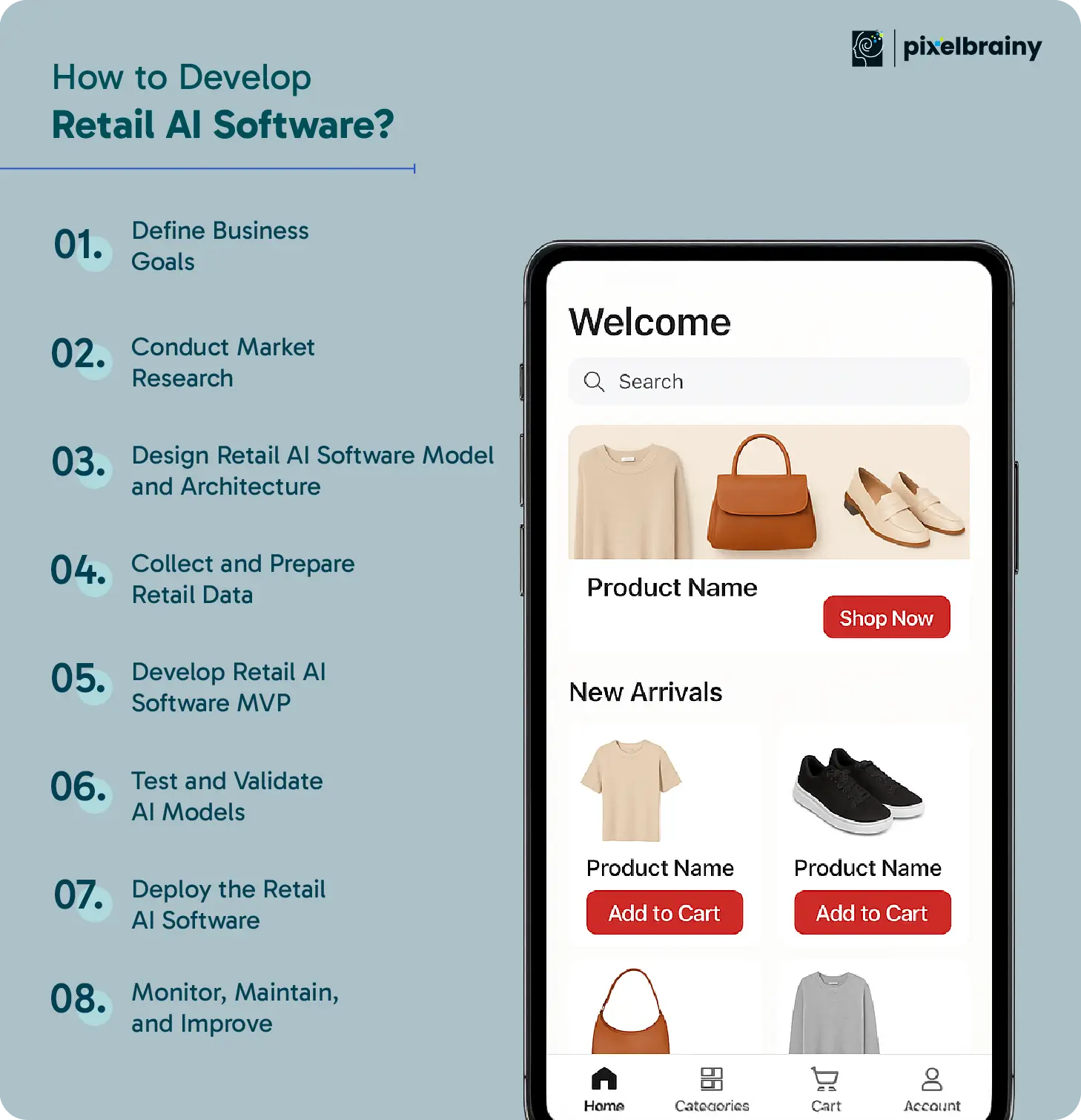
The base of any successful AI retail solution relies on setting clear, measurable business objectives. Whether you aim to reduce cart abandonment, optimize pricing strategies, or automate inventory management, you should define your priorities to make sure that the development process aligns with your business vision.
Time Estimate: 3–5 days
Roles Involved: Business Strategist, Product Owner, and Retail Consultant
This phase involves analyzing industry trends, customer expectations, and competitor offerings. Understanding where the market is heading helps you prioritize applicable features and ensures your AI software resolves actual retail pain points as well as meets technical needs.
Time Estimate: 1–2 weeks
Roles Involved: Market Analyst, Product Manager, and Competitive Researcher
At this stage, the developer plans the system’s architecture in detail, covering AI modules, data pipelines, backend infrastructure, and integration points with existing platforms like POS systems or e-commerce engines. The vision is to develop a scalable, modular architecture that backs both current requirements and future upgrades.
Time Estimate: 1–2 weeks
Roles Involved: Solution Architect, AI Engineer, and UI/UX Designer
You need high-quality, diverse retail data to train your AI models effectively. This demands accumulating data from past transactions, inventory records, website analytics, customer reviews, and more. Ensure your data is clean, labeled, and structured so AI can learn meaningful patterns and deliver precise results.
Time Estimate: 2–4 weeks
Roles Involved: Data Engineer, Data Scientist, and Retail Operations Analyst
The MVP incorporates only the crucial AI-powered features that suit your primary business goals. First, by launching a targeted version, you can validate assumptions, collect user feedback, and iterate before committing to full-scale development.
Time Estimate: 4–6 weeks
Roles Involved: Full-stack Developer, AI/ML Developer, QA Tester
Next, it's time to perform rigorous testing to ensure that the AI models behave as expected across various user scenarios. This involves accuracy testing, performance benchmarking, and real-world simulations. This way, you can emerge with a reliable, secure, and ready-for-deployment system.
Time Estimate: 2–3 weeks
Roles Involved: Data Scientist, QA Engineer, AI Ethics Consultant
Retail AI software deployment makes the software live either through a pilot program or a full launch. It includes software integration into your existing retail systems, configuring cloud or on-premise environments, and confirming stability for end-users.
Time Estimate: 1 week for pilot, 2–3 weeks for full rollout
Roles Involved: DevOps Engineer, IT Support, and Product Manager
Once you make your software live, continuous monitoring is required to track user behavior, pinpoint issues, and evaluate impact. Frequent maintenance leads to an updated model, which is bug-free and holds new features based on user feedback and data insights.
Time Estimate: Ongoing (start with monthly cycles)
Roles Involved: AI Ops Engineer, Data Analyst, and Product Owner
How much does it cost to build retail AI software?
The cost to develop AI retail software can vary depending on its scope, functionality, and integration complexity. A basic AI chatbot development may cost around $20,000, while building a full-scale, enterprise-grade AI platform may cost $150,000.
Below is a quick breakdown of estimated ranges and the key factors that influence pricing.
| Solution Type | Estimated Cost |
| MVP / Basic Chatbot System | $20,000 - $50,000 |
| Mid-level Recommendation Engine + Dashboard | $60,000 - $120,000 |
| Full-scale Retail AI Platform | $150,000+ |
| Factor | Description |
| Scope and Complexity | More features, multi-store support, and real-time capabilities increase the cost |
| Type of AI Models Used | Basic ML models cost less than custom NLP, computer vision, or deep learning |
| UI/UX Design Needs | Custom-designed, interactive interfaces require more time and budget |
| Integration Requirements | Connecting with ERP, POS, CRM, or payment systems adds to the development workload |
| In-house vs Outsourced Development | Outsourcing can reduce cost, but in-house may offer tighter quality control |

Developing AI-powered retail software needs a perfect combination of machine learning frameworks, cloud platforms, data processing tools, and frontend/backend technologies.
By choosing the top AI technologies, your retail business can provide optimal performance, scalability, and seamless integration with retail systems.
| Category | Tools & Technologies |
| AI/ML Frameworks | TensorFlow, PyTorch, Scikit-learn, OpenCV, spaCy, NLTK |
| Cloud Platforms & AI Services | AWS (SageMaker, Rekognition), Google Cloud AI, Microsoft Azure ML |
| Data Management & Processing | Apache Spark, Pandas, NumPy, Snowflake, BigQuery |
| Backend Technologies | Python, Node.js, FastAPI, Flask, PostgreSQL, MongoDB |
| Frontend & UI/UX | React, Vue.js, Figma, Adobe XD, Three.js, AR.js |
What are the challenges of developing and implementing AI in retail?
Undoubtedly, the potential of AI in the retail industry is massive, but making most of it is not easy as pie. Many businesses meet with various hurdles when trying to implement AI, from data problems to integration with existing systems.
Understanding these challenges upfront is crucial to avoid costly mistakes and create a solution that performs well in the real world.
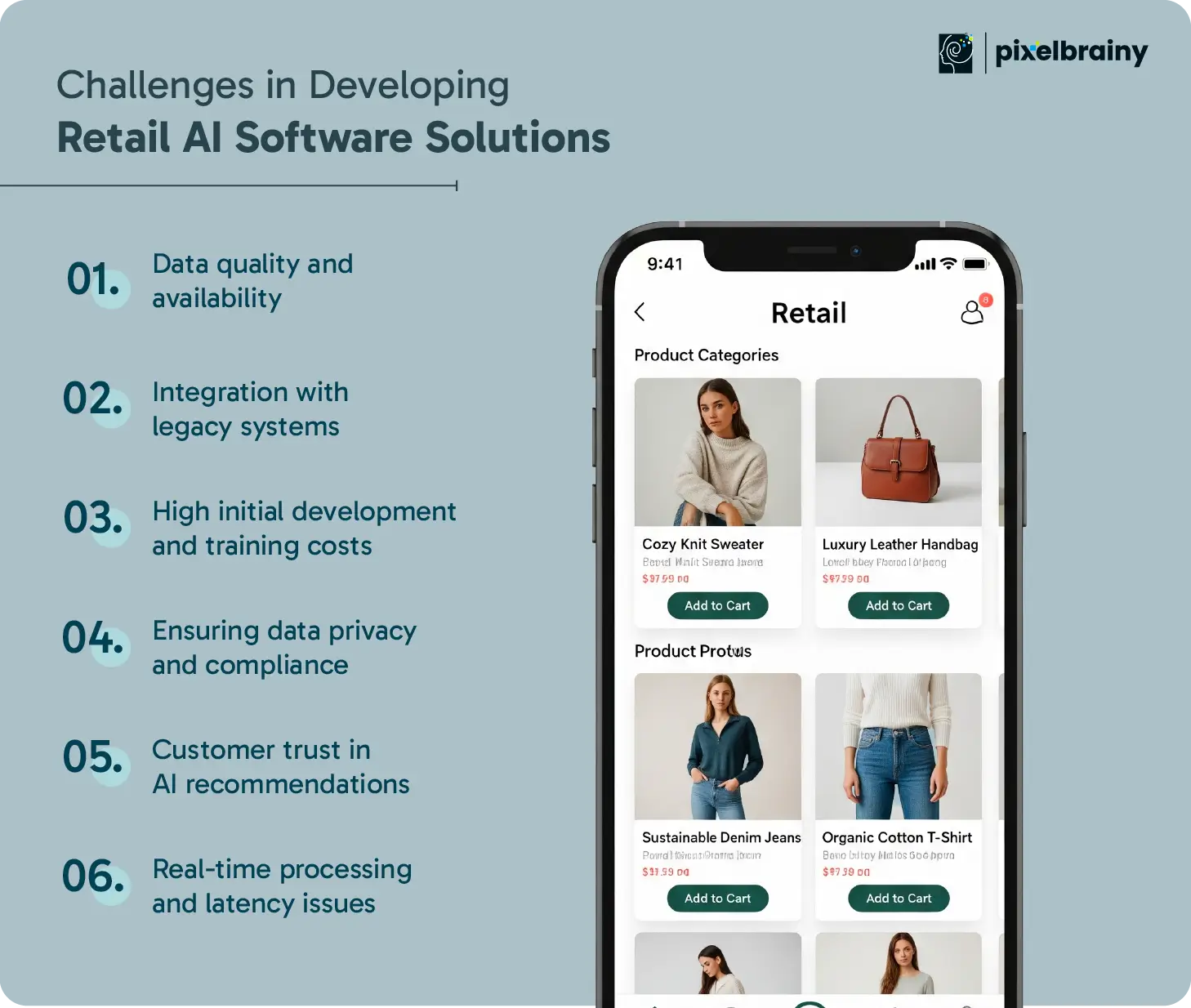
Solution: Retailers should implement robust data collection methods, cleaning processes, and centralized data pipelines to control poor data quality. Besides, structured, labeled datasets helps improving AI model accuracy and relevance.
Solution: You can attain effortless integration by using middleware APIs, microservices, and modular architectures that enable AI tools to communicate with older POS, ERP, or CRM systems without changing the entire stack.
Solution: Businesses can start with a minimum viable product (MVP), aiming at key features that offer quick ROI. They can consider open-source frameworks, cloud-based AI platforms, or outsourcing to proficient development firms to reduce overhead.
Solution: You should go for a privacy-by-design approach from the beginning. Leverage the power of anonymized data where possible, maintain audit trails, and stay updated with dynamic regulations to ensure complete compliance.
Solution: Transparency is key, so you need to thoroughly explain how AI recommendations are made and let customers provide feedback or refine suggestions. This leads to increased adoption and satisfaction.
Solution: Utilize scalable cloud infrastructure and edge computing where you find it essential to speed up data processing. Through effective model deployment, caching, and asynchronous requests, you can maintain fast, responsive AI interactions.
AI adoption in retail industry 2025 will not only automate business operations but also improve the entire customer journey, optimizing backend operations and unleashing new revenue streams.
PixelBrainy, an AI retail software development company, has years of experience building AI-powered retail software that confronts real business challenges, from demand forecasting and real-time personalization to inventory efficiency and customer support. Hire AI developers for retail from this firm and get custom AI solutions that help your retail business thrive.
Client: A mid-sized US-based fashion retailer
Challenge: Facing high return rates and poor product discoverability online
Solution: PixelBrainy developed a visual AI recommendation engine combined with smart inventory tracking and a virtual try-on feature using AR
Impact:
Ready to transform your retail business with robust AI capabilities? Let’s build smarter solutions - on time, within budget, and tailored to your goals.

Today, AI is not only a future trend but also a must-have to stay competitive in the retail industry. From improving customer engagement and predicting demands to streamlining operations and boosting revenue, retail AI software solutions are revamping how modern retail businesses operate.
The brands aiming to be leaders soon should invest in retail AI software development, acknowledging it as a strategic move. Whether you are planning to build retail AI software from scratch or seeking to enhance existing systems, you need to be set with a clear roadmap, a basic feature set, and the right tech partner who understands your industry.
Now is the time to get started, whether by taking a small step with AI chatbots for retail business or making a bigger leap with full-scale retail AI software development. The future is promising for retailers who choose to develop retail AI software solutions with purpose, precision, and long-term vision.
AI holds the power to beat varied challenges, such as poor demand forecasting, inventory mismanagement, inconsistent customer service, and low personalization. Solutions like predictive analytics, AI chatbots, and dynamic pricing engines assist retailers in making data-driven decisions and optimizing day-to-day operations.
Custom AI retail software development time depends on the project scope. A basic AI chatbot may take 4-6 weeks, while a more complex system, like a full-scale recommendation engine or inventory AI platform, can take 3-6 months or longer, based on integrations and testing cycles.
Costs for developing AI software solutions for retail can range from $20,000 for an MVP to over $150,000 for enterprise-grade platforms. However, factors like AI model complexity, design customization, and integration requirements significantly impact the final budget.
Retail personalization using AI can help boost sales and customer experience through product recommendations, visual search, voice assistants, and dynamic offers. It also supports faster checkouts, better customer service, and in-store navigation, resulting in increased satisfaction and higher conversions.
Retailers typically demand structured data, such as customer profiles, transaction histories, product metadata, inventory logs, and website/app analytics. The quality and volume of this data directly influence model precision and outcomes.
You can develop AI systems considering end-to-end encryption, secure APIs, and compliance with data protection regulations, like GDPR or CCPA. Regular audits and access controls also ensure customer and business data stay safe throughout AI operations.
About The Author
Sagar Bhatnagar
Sagar Sahay Bhatnagar brings over a decade of IT industry experience to his role as Marketing Head at PixelBrainy. He's known for his knack in devising creative marketing strategies that boost brand visibility and market influence. Sagar's strategic thinking, coupled with his innovative vision and focus on results, sets him apart. His track record of successful campaigns proves his ability to utilize digital platforms effectively for impactful marketing efforts. With a genuine passion for both technology and marketing, Sagar continuously pushes PixelBrainy's marketing initiatives to greater success.


Transform your ideas into reality with us.
Working with the PixelBrainy team has been a highly positive experience. They understand the design requirements and create beautiful UX elements to meet the application needs. The dev team did an excellent job bringing my vision to life. We discussed usability and flow. Sagar worked with his team to design the database and begin coding. Working with Sagar was easy. He has the knowledge to create robust apps, including multi-language support, Google and Apple ID login options, Ad-enabled integrations, Stripe payment processing, and a Web Admin site for maintaining support data. I'm extremely satisfied with the services provided, the quality of the final product, and the professionalism of the entire process. I highly recommend them for Android and iOS Mobile Application Design and Development.

Great experience working with them. Had a lot of feedback and I found that unlike most contractors they were bugging me for updates instead of the other way around. They were extremely time conscience and great at communicating! All work was done extremely high quality and if not on time, early! They were always proactive when it comes to communication and the work is great/above par always. Very flexible and a great team to work with! Goes above and beyond to present us with multiple options and always provides quality. Amazing work per usual with Chitra. If you have UI/UX or branding design needs I recommend you go to them! Will likely work with them in the future as well, definitely recommended!

PixelBrainy is a joy to work with and is a great partner when thinking through branding, logo, and website layout. I appreciate that they spend time going into the "why" behind their decisions to help inform me and others about industry best practices and their expertise.

I hired them to design our software apps. Things I really like about them are excellent communication skills, they answer all project suggestions and collaborate right away, and their input on design and colors is amazing. This project was complex and needed patience and creativity. The team is amazing to do business with. I will be using them long-term. Glad to see there are some good people out there. I was afraid to try and outsource my project to someone but I am glad I met them! I really can't say enough. They went above and beyond on this project. I am very happy with everything they have done to make my business stand out from the competition.

It was great working with PixelBrainy and the team. They were very responsive and really owned the project. We'll definitely work with them again!

I recently worked with the PixelBrainy team on a project and I was blown away by their communication skills. They were prompt, clear, and articulate in all of our interactions. They listened and provided valuable feedback and suggestions to help make the project a success. They also kept me updated throughout the entire process, which made the experience stress-free and enjoyable.

PixelBrainy is very good at what it does. The team also presents themselves very professionally and takes care of their side of things very well. I could fully trust them taking up the design work in a timely and organised manner and their attention to detail saved us lots of effort and time. This particular project was quite intense and the team showed that they function very well under pressure. Very much looking forward to working with her again!

It's always an absolute pleasure working with them. They completed all of my requests quickly and followed every note I had for them to a T, which made our process go smoothly from start to finish. Everything was completed fast and following all of the guidelines. And I would recommend their services to anyone. If you need any design work done in the future, PixelBrainy should be your first call!

They took ownership of our requirements and designed and proposed multiple beautiful variants. The team is self-motivated, requires minimum supervision, committed to see-through designs with quality and delivering them on time. We would definitely love to work with PixelBrainy again when we have any requirements.

PixelBrainy was a big help with our SaaS application. We've been hard at work with a new UI/UX and they provided a lot of help with the designs. If you're looking for assistance with your website, software, or mobile application designs, PixelBrainy and the team is a great recommendation.

PixelBrainy designers are amazing. They are responsive, talented, and always willing to help craft the design until it matches your vision. I would recommend them and plan to continue them for my future projects and more!!!

They were awesome! Did a good job fast, and good communication. Will work with them again. Thank you

Creative, detail-oriented, and talented designers who take direction well and implement changes quickly and accurately. They consistently over-delivered for us.

PixelBrainy team is very talented and creative. Great designers and a pleasure to work with. PixelBrainy is an excellent communicator and I look forward to working with them again.

PixelBrainy has a very talented design team. Their work is excellent and they are very responsive. I enjoy working with them and hope to continue on all of our future projects.
